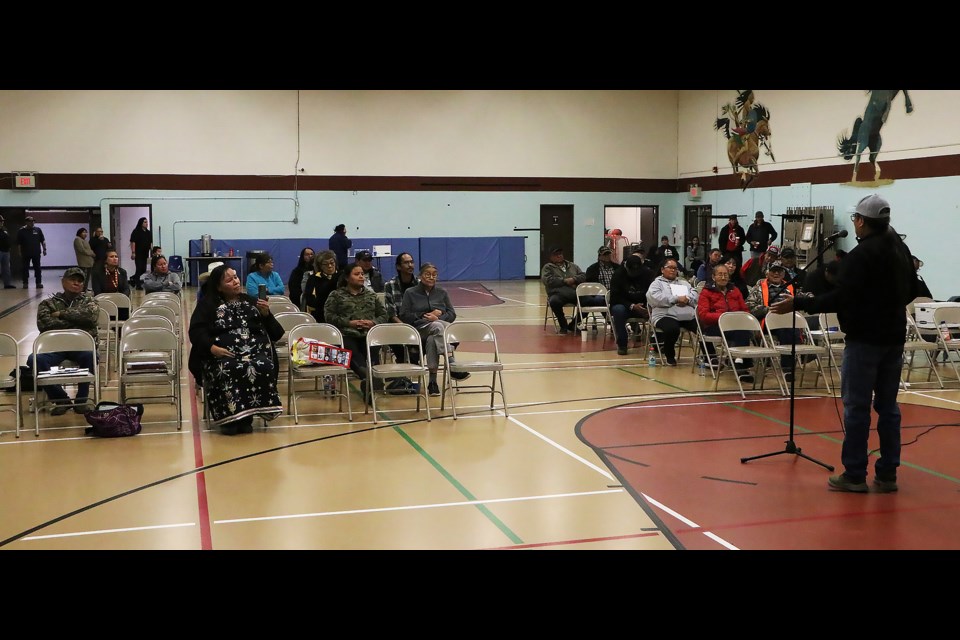ÎYÂRHE NAKODA – Community members seeking resolve with Stoney Nakoda Nation (SNN) outside the court in the wake of concerns over chiefs and councillors’ spending were disappointed all but one councillor attended a meeting last week called by elders.
About 50 people attended the discussion at the Morley Gymnasium in Mînî Thnî, calling for Îyârhe Nakoda First Nation’s three band councils and administration to share details of current and former council expenses, execute financial audits of financial statements and for greater accountability to band members in the future.
“Our hope is that this civil discussion on issues that matter and are concerning to the Stoney members will bring financial awareness, updates, open communication, mutual understanding and resolutions,” states a letter sent to Chiniki, Goodstoney and Bearspaw band councils, and SNN’s CEO and CFO.
“We hope you will be in attendance and make time as these matters are important to your community elders and members.”
The letter, sent a week before the Oct. 19 meeting, is signed by nine elders – respected knowledge keepers in the community – and comes after a recent civil lawsuit made against SNN in the Court of King’s Bench.
Kenny Hunter, Wanda Rider and Muriel Labelle, of Goodstoney, Bearspaw and Chiniki First Nations, respectively, took the governing body to court in June, demanding it publish fiscal transparency documents required under the federal First Nations Financial Transparency Act.
The information requested was released to the satisfaction of the court, filling a four-year gap – since 2018 – where SNN did not publish any of its finances, publicly or privately to band members.
But Hunter, Rider and Labelle continue to advocate for greater transparency from the Nation’s administration and elected officials, unhappy with council salaries, expenses, and lack of spending context in the reports.
Quarterly meetings to update band members on council and community matters have become a thing of the past, said Hunter, but must be brought back to ensure accountability of elected officials and administration.
“They fail to consult the shareholders and the beneficiaries, which are the band members. They fail to consult us when it comes to band funds for any money held in trust or any businesses being brought to the community,” Hunter said.
J.R. Twoyoungmen, one of the elders who signed the letter, along with his wife, Pauline Twoyoungmen, spoke of the importance of council respecting tribal customs and its duty to consult its band members in the interest of all, especially younger generations.
“We have to protect the welfare of our future generations,” he said, addressing those gathered at the meeting mostly in the Stoney language, as other elders and speakers did.
Chiniki Coun. Verna Powderface was the sole elected official in attendance of 12 councillors and three chiefs. None of SNN’s administrative staff was present.
Powderface said it’s difficult to balance tribal customs and traditions within governing colonial systems and encouraged conversation outside the courtroom, adding she could only speak for herself and not for the rest of Chiniki council, or Stoney Tribal Council as a whole.
“Colonialists take each other to court,” she said. “Tribal custom is to bring elders and members together to talk things out.”
“We can take the colonial approach and take each other to court and spend more money or we can resolve things here with our own elders and members.”
Powderface encouraged community members with concerns to approach chiefs and councillors directly to ask questions.
Hunter said many have tried this approach unsuccessfully.
“I delivered this letter, and I told them to make their schedules around this date and now they’re not here, so it’s really frustrating because this keeps happening,” he said. “We are being just kind of pushed to the side, it seems like band members are not important.
“But we are important when it comes to election time.”
The Outlook reached out but did not receive a response in time for publication from Stoney Tribal Council and was told administrative staff will not speak on the matter.
The Local Journalism Initiative is funded by the Government of Canada. The position covers Îyârhe (Stoney) Nakoda First Nation and Kananaskis Country.




